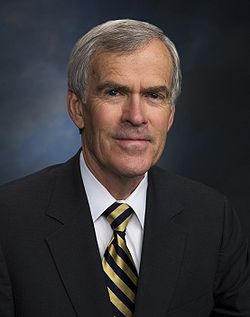Jeff Bingaman | |
|---|---|
 Official portrait, 2008 | |
| Chair of the Senate Energy Committee | |
| In office January 3, 2007 –January 3, 2013 | |
| Preceded by | Pete Domenici |
| Succeeded by | Ron Wyden |
| In office June 6,2001 –January 3,2003 | |
| Preceded by | Frank Murkowski |
| Succeeded by | Pete Domenici |
| In office January 3,2001 –January 20,2001 | |
| Preceded by | Frank Murkowski |
| Succeeded by | Frank Murkowski |
| United States Senator from New Mexico | |
| In office January 3,1983 –January 3,2013 | |
| Preceded by | Harrison Schmitt |
| Succeeded by | Martin Heinrich |
| 25th Attorney General of New Mexico | |
| In office January 1,1979 –January 1,1983 | |
| Governor | Bruce King |
| Preceded by | Toney Anaya |
| Succeeded by | Paul Bardacke |
| Personal details | |
| Born | Jesse Francis Bingaman Jr. October 3,1943 El Paso,Texas,U.S. |
| Political party | Democratic |
| Spouse | Anne Kovacovich |
| Children | 1 son |
| Education | Harvard University (BA) Stanford University (JD) |
| Signature | |
| Military service | |
| Allegiance | |
| Branch/service | |
| Years of service | 1968–1974 |
| Unit | United States Army Reserve |
Jesse Francis "Jeff" Bingaman Jr. (born October 3, 1943) is an American retired politician who served as a United States Senator from New Mexico from 1983 to 2013. A member of the Democratic Party, he previously served as the 25th Attorney General of New Mexico from 1979 to 1983. During his time in the Senate, Bingaman served as Chairman of Committee Outreach for the Senate Democratic Caucus and was the longtime chair of the Senate Energy Committee.
Contents
- Early life
- State Attorney General
- U.S. Senate
- Committee assignments
- Caucus memberships
- Tenure
- Political positions
- Immigration
- Energy and the environment
- Social issues
- Iraq War
- Crime and torture
- Health care reform
- Electoral history
- Personal life
- Awards and honors
- Footnotes
- External links
Bingaman worked on Congressional committees on Armed Services; Energy and Natural Resources (Chairman); Finance; Health, Education Labor & Pensions; Joint Economic Committee; among others. He advocated environmental issues such as for clean energy policies and protection of wildlife and public lands. Bingaman took positions favoring immigration reform with increased border enforcement coupled with a guest worker program.
After he left the Senate, he returned to his alma mater Stanford Law School as a fellow of its Steyer–Taylor Center for Energy Policy and Finance. [1]

